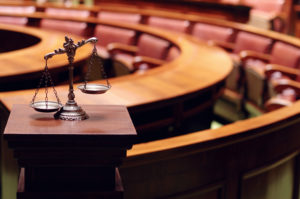December 2, 2016
While most people are familiar with the trial phase of criminal cases, many may not be aware that a criminal case actually involves many steps that are not so glamorous or exciting. Combined, all of the phases in a criminal case can cause it to stretch for weeks or even months. In most cases, criminal proceedings follow a similar pattern that varies little from state to state. Here, we will walk through and explain some of the most important steps in the criminal procedure process.
1. Arrest or Notice to Appear
All criminal cases begin with either an arrest or a notice to appear. An arrest occurs either pursuant to a warrant or because a law enforcement officer placed a person under arrest with probable cause. After a person is arrested, he or she is booked and normally appears before a judge within 24-48 hours. A notice to appear can be ordered in lieu of an arrest and booking if the defendant has been compliant and is not a threat to himself or the public, a flight risk, or a wanted person.
2. First Appearance
The purpose of a first appearance, also known as an “initial appearance,” is to inform the defendant of his or her criminal charges, ensure that he or she has access to legal counsel, and to determine the conditions of pretrial release, if any.
3. Preliminary Hearing
A preliminary hearing is a pretrial hearing where the judge decides if there is enough evidence against the defendant to force the defendant to stand trial. In a preliminary hearing, evidence is held to the lower standard of probable cause rather than reasonable doubt. This means that it must be likely to a reasonably prudent person that a crime was committed and the defendant committed it. At this stage, the defense attorney can make a motion to the judge to dismiss the case if he or she feels that the evidence does not meet this threshold.
4. Plea Bargaining
If the case is not dismissed at the preliminary hearing, the prosecution and defense will normally try to avoid a trial by negotiating a plea agreement. In most cases, plea bargains allow the defendant to plead guilty to a lower charge than that which he or she originally received in exchange for more lenient sanctions. For example, if charged with first-degree murder, a defendant can enter into a plea agreement wherein he pleads guilty to second-degree murder and receives the requisite number of years in prison. If he decides not to take the plea agreement and plead not guilty, he faces a potentially much longer prison sentence if he is found guilty of the first degree murder.
5. Arraignment
An arraignment is the stage in which the defendant enters his or her plea—either guilty, not guilty, or no contest. A plea of guilty or no contest will fast-track the case straight to the sentencing stage, while a not guilty plea will send the case to trial.
6. Trial
If a defendant does not accept a plea agreement and pleads not guilty, a trial will commence. This is the part of the criminal process most people are very familiar with, where each side argues its case, calls witnesses, and presents evidence. This can be done either before a judge alone or before a judge and a jury. At the end of trial, the defendant will be found either guilty or not guilty. If found not guilty, the defendant is free to leave the court.
7. Sentencing
If the defendant pleads guilty or is found guilty at trial, the case moves into the final sentencing phase. Here, the judge will hear arguments from both prosecution and defense regarding the appropriate punishment for the defendant. There are several punishments a judge can choose from, including prison, probation, community service, or fines.
If you have been charged with a crime, you need an experienced St. Petersburg criminal defense lawyer to explain your options to you and walk you through the criminal process. Contact the Khonsari Law Group today for a free consultation.
1https://www.law.cornell.edu/wex/probable_cause
2https://www.leg.state.fl.us/statutes/index.cfm?App_mode=Display_Statute&URL=0700-0799/0782/Sections/0782.04.html


